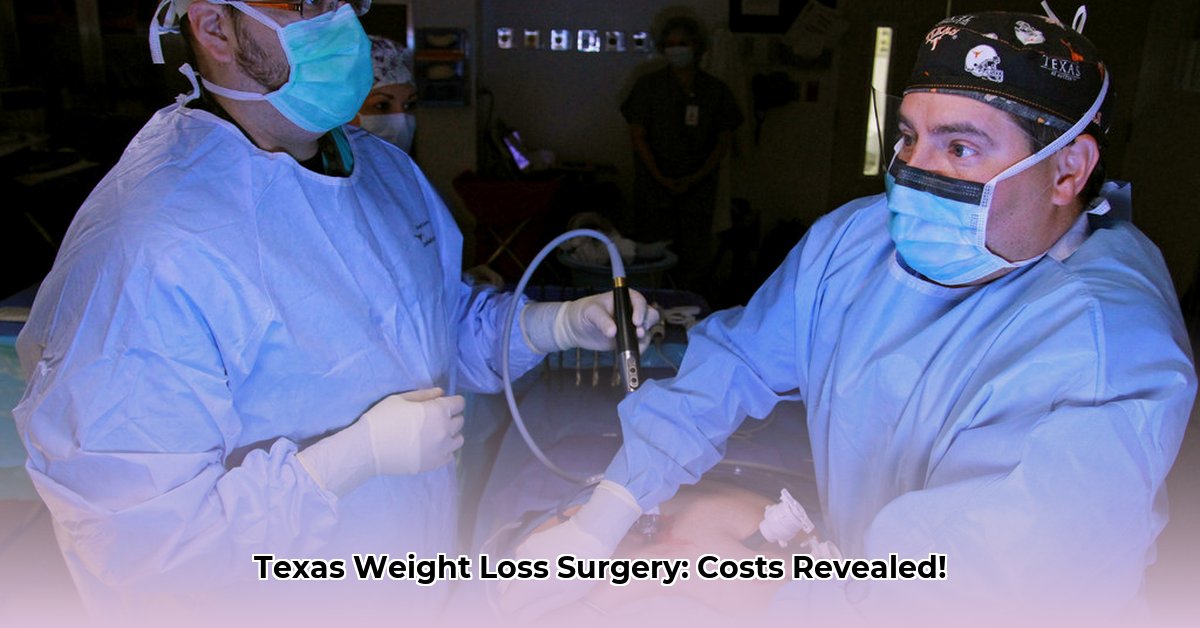
Thinking about weight-loss surgery in Texas? It's a major decision, and understanding the costs is a crucial first step. This comprehensive guide breaks down the expenses, explores financing options, and provides a step-by-step plan to help you navigate this journey confidently. We'll demystify the process, empowering you to make informed choices about your health and well-being.
Decoding the Dollars: Factors Affecting Weight Loss Surgery Costs
The cost of weight loss surgery in Texas isn't uniform. Several factors significantly impact the final price. Let's break them down to get a clear picture of what influences the total cost.
Type of Procedure
The type of procedure significantly affects cost. A gastric bypass, for instance, often involves more complex surgical techniques and longer operating times than a sleeve gastrectomy, thus impacting the cost. Understanding the differences between procedures is vital for budget planning.
Surgeon's Experience and Reputation
Experienced, highly-regarded surgeons often charge more. This is understandable, as their expertise and established reputation can translate to better surgical outcomes and a lower risk of complications. While a higher initial cost might seem daunting, the potential benefits and reduced complication risks should be considered.
Location and Facility Type
The location and type of surgical facility also affect pricing. Procedures performed at a large, specialized hospital in a major city will typically be more expensive than those at a smaller, well-regarded clinic in a less populated area. This is similar to the cost difference between a five-star hotel and a more budget-friendly accommodation.
Insurance Coverage
Insurance coverage significantly alters the patient's out-of-pocket expense. Some insurance plans fully or partially cover weight loss surgery, while others provide limited coverage or none. The patient's specific insurance policy and its coverage limits for bariatric surgery are crucial to understanding the overall financial liability.
Beyond the Operating Room: Hidden Costs of Weight Loss Surgery
The surgeon's fee is only a portion of the total cost. Several other expenses must be factored into your budget.
Pre-Operative Costs
These include consultations, pre-operative blood work, electrocardiograms (EKGs), and any other necessary medical evaluations to assess your candidacy for surgery. These add up before you even reach the operating room, highlighting the importance of early budgetary planning.
Post-Operative Costs
Post-operative care encompasses follow-up appointments, medication costs, and potential costs associated with managing any complications arising after surgery. These ongoing expenses are often overlooked but must be a part of your financial plan.
Additional Costs
Travel and accommodation expenses are important considerations, especially if you're traveling to a surgical facility outside your local area. Careful planning is vital to include these costs in your overall budget.
Unraveling Insurance Coverage: Navigating the Labyrinth
Insurance coverage for weight loss surgery is complex. Many insurers only approve the procedure if your BMI (Body Mass Index—a measure of body fat based on height and weight) is significantly high and you have obesity-related health problems, such as type 2 diabetes or sleep apnea.
Proactive Steps:
- Thorough Policy Review: Carefully review your insurance policy to understand your coverage for bariatric surgery. Don't rely on assumptions.
- Direct Contact: Contact your insurer directly to clarify details regarding pre-authorization, covered procedures, deductibles, co-pays, and out-of-pocket maximums.
- Written Confirmation: Gather written confirmation of your coverage to avoid disputes during and after the procedure.
Financing Your Weight Loss Surgery Journey: Available Options
The upfront cost can be significant. However, several options help manage the financial burden.
Payment Plans
Many surgeons and surgical centers offer payment plans, often with monthly installments spread over a few years. These plans usually incur interest charges. Compare interest rates and repayment terms thoroughly before committing to a specific payment plan.
Financial Assistance Programs
Some facilities offer financial assistance programs based on income or other eligibility criteria. Inquire about these options during your initial consultation. This could significantly reduce your out-of-pocket costs and make the procedure more feasible.
Medical Loans
Consider medical loans tailored to cover medical expenses, including weight loss surgery. Explore different lenders to compare interest rates and repayment terms. Always thoroughly evaluate the loan terms to make sure that this debt is manageable within your budget in the long term.
A Step-by-Step Actionable Guide to Planning Your Surgery
This detailed plan will help you navigate the process of planning your weight loss surgery in Texas.
- Thorough Research: Identify several surgeons and facilities; request detailed cost estimates from each, including all associated fees.
- Insurance Scrutiny: Read your policy carefully, contact your insurance provider before scheduling any procedures for pre-authorization.
- Budgeting: Prepare a realistic budget, factoring in surgical and ancillary expenses (pre-op, post-op, travel, etc.).
- Financing Exploration: Explore all available financing options and compare terms.
- Multiple Surgeon Consultations: Meet with at least two or three surgeons to discuss treatment options and assess financing compatibility.
Navigating Weight Loss Surgery Costs in Texas: A Long-Term Perspective
The initial investment in weight-loss surgery is substantial. However, the long-term benefits often outweigh the costs. Reducing or eliminating obesity-related health issues (diabetes, hypertension, sleep apnea) can lead to significant cost savings on future medical care. Consider this a long-term investment in your health and well-being.
Potential Challenges: Preparing for the Unexpected
Unforeseen complications can arise and significantly influence your financial planning.
| Risk Factor | Likelihood | Severity | Mitigation |
|---|---|---|---|
| Unexpected Medical Complications | Possible | High | Comprehensive pre-surgical evaluation; emergency fund |
| Insufficient Insurance Coverage | Possible | High | Thorough policy review; explore alternative financing |
| Poor Adherence to Post-Op Care | Possible | Medium | Strong support system; clear communication with medical team |
| Unexpected Costs | Possible | Low | Detailed cost breakdown request; contingency budgeting |
Remember, planning is key. Through careful research, understanding your resources, and proactive steps, you can confidently approach your weight loss surgery journey in Texas.